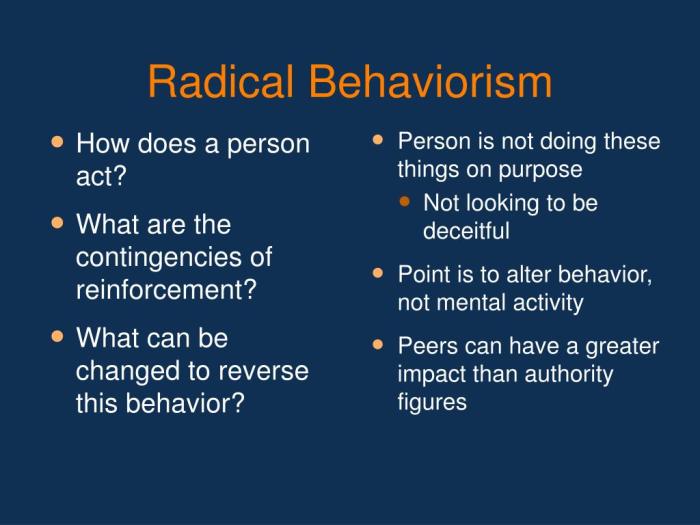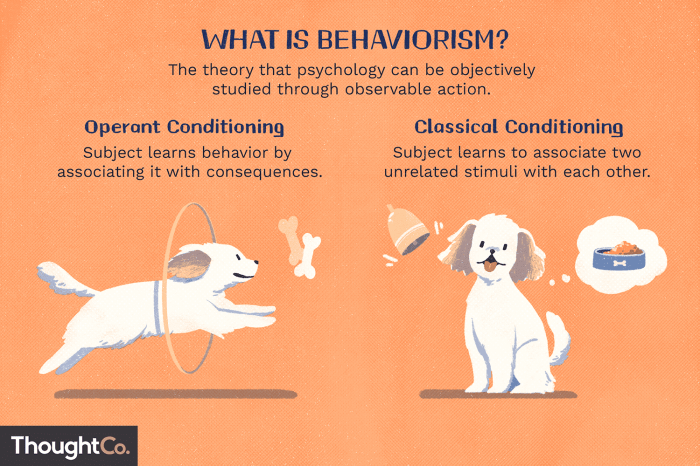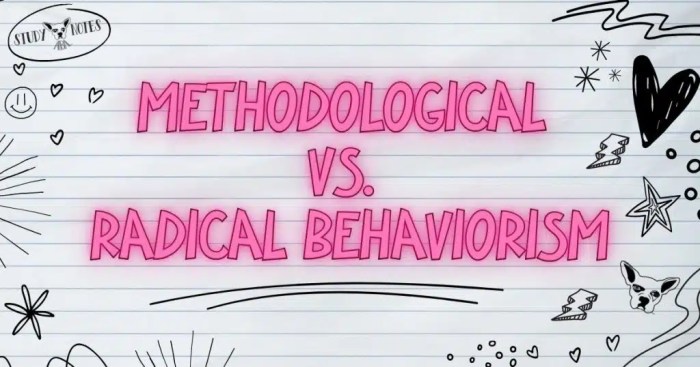Methodological behaviorism vs radical behaviorism – In the realm of behavioral science, the contrasting perspectives of methodological behaviorism and radical behaviorism have sparked significant debate. Methodological behaviorism, rooted in empirical observation, focuses on observable behaviors, while radical behaviorism delves into the underlying environmental and cognitive factors shaping behavior.
This introductory passage invites readers to delve into the intricacies of these two approaches, unraveling their core principles, applications, and the nuanced differences that distinguish them.
Methodological behaviorism, as espoused by B.F. Skinner, emphasizes the scientific study of observable behaviors, seeking to establish functional relationships between stimuli and responses. Radical behaviorism, championed by B.F. Skinner, delves deeper, examining the role of environmental contingencies and cognitive processes in shaping behavior.
Methodological Behaviorism

Methodological behaviorism, also known as logical positivism, is a philosophical approach to psychology that emphasizes the importance of objective, observable behavior in the study of human behavior. Methodological behaviorists argue that the only way to understand human behavior is to study it in a scientific manner, using methods that can be replicated and tested by other researchers.
The core principles of methodological behaviorism include:
- Behavior is the only valid subject matter for psychology.
- Behavior can be studied objectively, using scientific methods.
- The goal of psychology is to predict and control behavior.
Methodological behaviorism has been used in a variety of research studies, including studies on learning, motivation, and emotion. Some of the most famous methodological behaviorists include John B. Watson, B.F. Skinner, and Ivan Pavlov.
Methodological behaviorism has a number of strengths, including its emphasis on objectivity, its use of scientific methods, and its focus on prediction and control of behavior. However, methodological behaviorism has also been criticized for its narrow focus on observable behavior, its neglect of mental processes, and its emphasis on control.
Radical Behaviorism

Radical behaviorism is a philosophical approach to psychology that emphasizes the importance of environmental factors in the development and maintenance of behavior. Radical behaviorists argue that all behavior is learned and that it is shaped by its consequences. They also argue that mental processes are not necessary to explain behavior.
The core principles of radical behaviorism include:
- All behavior is learned.
- Behavior is shaped by its consequences.
- Mental processes are not necessary to explain behavior.
Radical behaviorism has been used in a variety of research studies, including studies on language acquisition, social behavior, and addiction. Some of the most famous radical behaviorists include B.F. Skinner, Burrhus Frederic Skinner, and Sidney Bijou.
Radical behaviorism has a number of strengths, including its emphasis on the environment, its focus on learning, and its rejection of mentalism. However, radical behaviorism has also been criticized for its narrow focus on environmental factors, its neglect of individual differences, and its emphasis on control.
Comparison of Methodological Behaviorism and Radical Behaviorism
| Methodological Behaviorism | Radical Behaviorism | |
|---|---|---|
| Focus | Observable behavior | Environmental factors |
| Causes of behavior | Stimuli and responses | Consequences |
| Role of mental processes | Not necessary | Not necessary |
| Emphasis | Prediction and control | Learning |
| Strengths | Objective, scientific, predictive | Environmental focus, learning emphasis, rejection of mentalism |
| Limitations | Narrow focus, neglects mental processes, emphasis on control | Narrow focus on environmental factors, neglects individual differences, emphasis on control |
Applications of Methodological Behaviorism and Radical Behaviorism

Methodological behaviorism has been used to solve a variety of real-world problems, including:
- Developing educational programs
- Improving workplace productivity
- Treating psychological disorders
Radical behaviorism has been used to solve a variety of real-world problems, including:
- Teaching children with autism
- Reducing aggression in children
- Improving parenting skills
Methodological behaviorism and radical behaviorism have the potential to be used to solve a variety of problems in a variety of fields, including education, business, and healthcare.
Essential FAQs: Methodological Behaviorism Vs Radical Behaviorism
What is the key difference between methodological behaviorism and radical behaviorism?
Methodological behaviorism focuses solely on observable behaviors, while radical behaviorism considers both observable and unobservable factors that influence behavior, such as thoughts, emotions, and environmental contingencies.
How is methodological behaviorism applied in research?
Methodological behaviorism is used in research to identify and manipulate environmental factors that influence behavior, often through controlled experiments and operant conditioning techniques.
What are the limitations of radical behaviorism?
Radical behaviorism has been criticized for its limited ability to explain complex human behaviors, such as language and creativity, which may involve cognitive processes beyond the scope of its analysis.